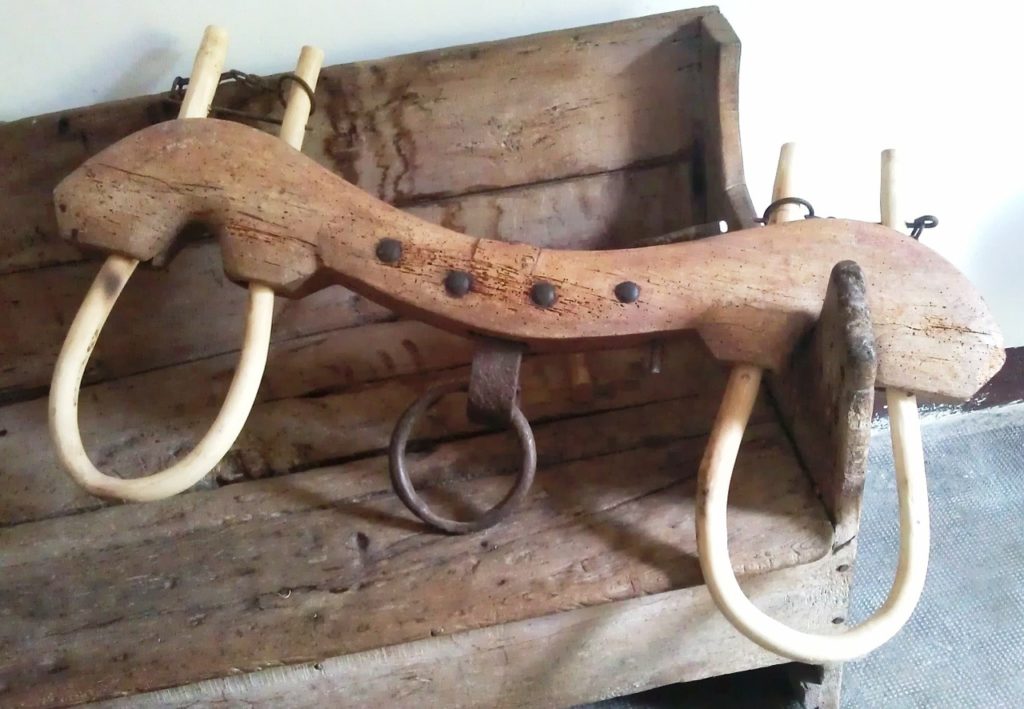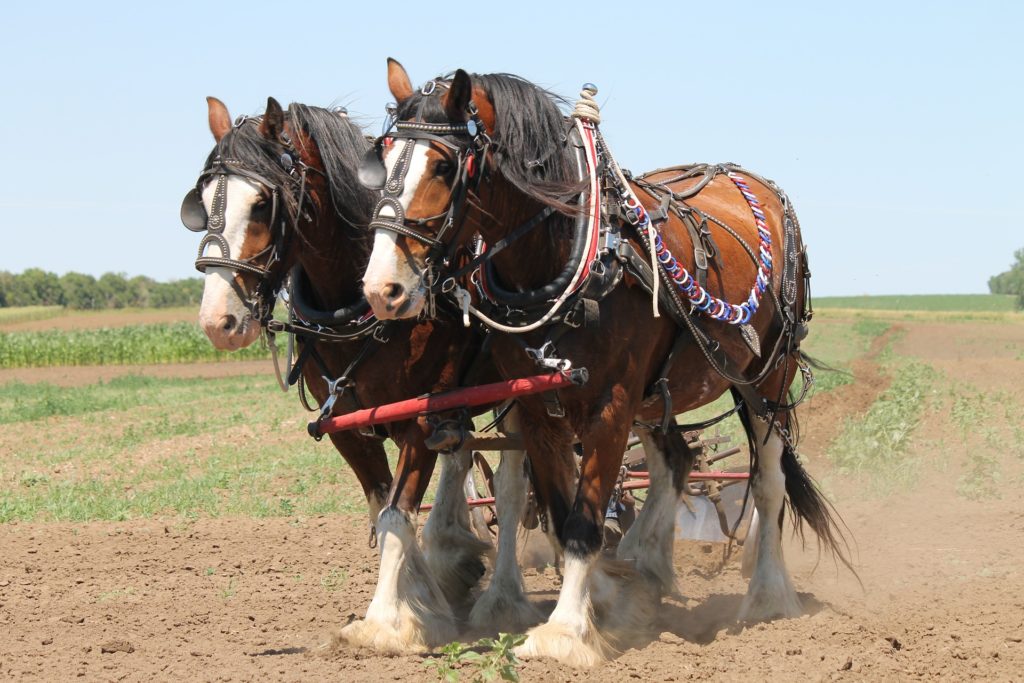Yoked Together
by Dr. Bill Clark
My favorite commercial this Christmas, oddly enough, was the Wells Fargo ad with the stagecoach traveling down a snowy lane, passing snowmen on the road who offered their carrot noses to the team of horses who daintily accepted the gifts before continuing to deliver their precious cargo of Christmas presents to the townspeople. Like so many Anheuser Busch ads where beautiful Clydesdale horses haul the beer wagon with precision and teamwork, the imagery captures an idea of animals “yoked together” or to something in a way that was powerful, graceful and efficient.
In his second letter to Corinth, Paul writes,
“Do not be yoked together with unbelievers.” (6:14 -NIV)
“Do not harness yourselves in an uneven team with unbelievers.” (JB)
“Do not be mismated with unbelievers.” (RSV)
“Don’t become partners with those who reject God.” (The Message)
Many of us are familiar with this warning. It is often applied to both marriage and business partnerships in a rather broad and ominous manner_ “It’s a really bad idea to team up with someone who doesn’t serve God! It won’t work! That will come back to haunt you, you’ll see!” The following verses, “For what do righteousness and wickedness have in common? Or what fellowship can light have with darkness?” certainly underscore this potential (if overstated) danger. But lately I have been thinking more about the imagery itself, especially with regard to marriage.
In part my thinking was prompted by the wedding of the daughter of my long time great friend. She’d asked me to officiate, which was an honor — and a responsibility. Early the morning of the wedding it seemed like the Holy Spirit woke me specifically to consider this imagery of being yoked together.
Be Yoked Together in Strength
I wondered what being “unequally yoked together” meant, what it looks like (and honestly, why it is so important)? First, it doesn’t mean “don’t be different.” You can pair a black horse and a brown horse, an extrovert and an introvert, a country music fan and a heavy metal fan. Diversity is good. What isn’t helpful is to be different when it comes to size or strength. Picture a pony with a Clydesdale. Over time, the Clydesdale will pull not only the wagon, sleigh or plough, but the pony as well. That’s one form of inequality that occurred to me.
Being equally yoked, doesn’t mean don’t be different.
Be Equally Yoked Together in Commitment
The second type of inequality that I pictured was with regard to effort, determination, or commitment. Picture what happens when one horse just gets tired or bored and says, “I’m sick of this” and sits down. Or starts focusing on getting out of the yoke (which apparently is hard for an animal to do). Once again, the other horse has to pull both the wagon and the partner. Not hard to imagine that the one “working” horse or mule would think, “This would be a lot easier if I were alone!”
Be Equally Yoked Together in Direction
The third form of inequality, by far the most common I think, is about direction. Imagine this conversation:
 “We should go right.”
“We should go right.”
“No, left!”
“In my family we go right!”
“In mine, we go left!”
“When I was single I went right & it worked for me!”
“No it didn’t!”
“Says who?”
…and so on.
The picture here is two animals thinking independently about the direction they should take. What strikes me in this caricature is that the two horses are ignoring both the teamwork and the idea that someone or something else is driving them or trying to direct them. Their own personal goals or approaches are more important than the wagon or larger task.
Know What is in the Wagon
That led me to wonder if the biblical metaphor was also inviting us to ask another question about the two animals yoked together; that is, What are they pulling? If it’s not big or valuable then the equality thing is not such a big deal – but what if it is very important? In other words, “What’s in the wagon? And, who’s driving it? What’s the mission – the destination we are committing or hitching ourselves to and why?”
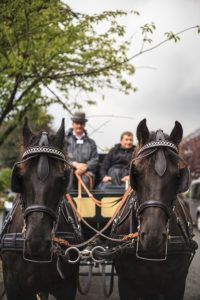 Most of us aren’t farmers, or pioneers. We don’t use wagons, sleighs, plows, or other tools or vehicles that employ animals and yokes. In fact, I assume that our fierce American sense of freedom and liberty chafes at the idea of being yoked to anything; at least mine does. It smacks of slavery, bondage, or being trapped. I don’t want to be yoked to something or someone unless it’s really important. Unless it’s an honor.
Most of us aren’t farmers, or pioneers. We don’t use wagons, sleighs, plows, or other tools or vehicles that employ animals and yokes. In fact, I assume that our fierce American sense of freedom and liberty chafes at the idea of being yoked to anything; at least mine does. It smacks of slavery, bondage, or being trapped. I don’t want to be yoked to something or someone unless it’s really important. Unless it’s an honor.
This couple that I married each had grandparents who modeled strong and diverse marriages that had inspired them. They each had parents who’d been faithfully and “happily” married for over 30 years. This young man and woman have a legacy of marital success that few have these days and that meant something to them. They were not taking vows lightly or entering into the covenant of marriage casually. Like all people getting married, they have little idea of what lies ahead on the journey, but they consciously, willfully placed their “heads” in the yoke. They committed to the task, the calling of marriage. At some level they understood; marriage is an honor.
What is in the Wagon?
The institution of marriage is certainly one possibility. Fewer and fewer young people see the real value in marriage, in part because they see so few examples of successful, let alone inspiring marriages.
Secondly, in today’s world there is little to prevent sexual, financial, emotional and geographic partnering without the “burden,” hassle or heaviness of marriage. In addition, “breaking up” is a lot easier than divorce.
People still seem to want to marry, but the motive now seems different. Marriage may be turning into a formality, a technical contract that simply makes everything from loans to parenting more “convenient.” Frankly, some weddings feel like this; an excuse to have an extravagant party while acknowledging the contractual agreement of the couple. Few would “bet” on the longevity of a marriage these days; we all know the statistics. There’s no question the institution is in trouble; it lacks credibility in today’s world as a viable model for relational success. Oddly enough, divorce — if you view it as an “institution,” remains a powerful (harmfully so) experience.
People still seem to want to marry, but the motive now seems different.
Also in the wagon might be the picture that true marriage depicts. Not just the concept that marriage illustrates the depth of God’s love for and covenant with His people, which is the biblically stated imagery. That’s profound but not easily seen by those uninterested in the heart or person of God.
This “yoked together” imagery also captures the idea of two people willingly joining together to go on a journey which will be hard and tiring, that supersedes the individual desires of each, and causes mutual submission to a mission or purpose that is vital. The oneness we think of in marriage can be equated to the teamwork of the horses, the joint passion for the task and the joy of serving together.
This yoked imagery also captures the idea of two people willingly joining together to go on a journey which will be hard and tiring.
Likewise, children — the next generation, are in the wagon. Good marriage provides a safe home and environment that shapes the interior life and mind of a child in a way that provides something little else can. Fairy tales and romantic comedies don’t form faith in intimacy; children seeing strong marriages and strong adult friendships do. That is in the wagon.
Know What is Being Plowed
If you shift the image a bit, what’s being plowed?
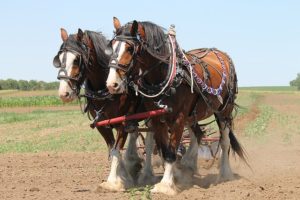 The rare, good marriages bite into the common sentiment. They suggest that the world is missing out on something good. True marriages hint at something mystical that requires more than self-determination and personal maturity (though these are hardly a given).
The rare, good marriages bite into the common sentiment. They suggest that the world is missing out on something good. True marriages hint at something mystical that requires more than self-determination and personal maturity (though these are hardly a given).
Secondly, the hearts and souls of the partners are also being plowed, turned over, made able to produce a harvest. Long time partners know that their marriage has caused growth in them like nothing else they’ve known. Marriage exposes limits, strengths, needs, fears, doubts, defenses, desires, and histories. That’s why it requires such unbridled commitment, the strength of Clydesdales, the heart of sled dogs, the determination of mules, the submission of oxen.
[In marriage] the hearts and souls of the partners are also being plowed, turned over, made able to produce a harvest.
The one behind the plow knows this. The one on the wagon seat with the reins and whip knows this. The one who designed marriage in the first place knows that being yoked to Him and to one another is powerful, necessary, and beautiful.
Marriage requires such unbridled commitment, the strength of Clydesdales, the heart of sled dogs, the determination of mules, the submission of oxen.
My thoughts on the imagery behind being yoked together remain unfinished, a “work in progress.” I suspect there is much food for thought here if we get past our being offended or dismissive of such an archaic picture. The picture sheds light on one of today’s more pressing question: “Does marriage really work, and if so — how?”
About the Author
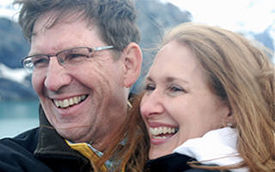 Dr. William (Bill) Clark is a gifted and effective psychotherapist with a passion for healing and growth. His extensive training in Clinical Psychology, coupled with his studies in Biblical Counseling and Theology set the foundation of Bill’s theory of counseling. He uses these ideas currently in his psychotherapy practice, and as a genesis to serving as the co-founder and President of the Lay Counselor Institute (LCI).
Dr. William (Bill) Clark is a gifted and effective psychotherapist with a passion for healing and growth. His extensive training in Clinical Psychology, coupled with his studies in Biblical Counseling and Theology set the foundation of Bill’s theory of counseling. He uses these ideas currently in his psychotherapy practice, and as a genesis to serving as the co-founder and President of the Lay Counselor Institute (LCI).
Want to host a marriage workshop at your church?
LCI offers a variety of workshop topics related to marriage & dating, as well as opportunities to train your ministry team to counsel around these topics effectively.
Looking for some practical training for caring for others?
Join us for one of our training opportunities to help you effectively care for others. The Lay Counselor Institute offers biblical & practical training to help you understand your story, and come alongside others in their “bike ride.” While LCI trainings are for Lay Counselors, the skills and concepts covered in this workshop are applicable and transferrable to anyone in relational roles including pastors, small group leaders, Bible study teachers, and more.

